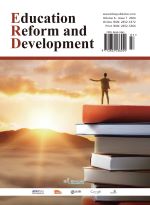Abstract
Translation pedagogy is a key and difficult part of college English, and students have certain difficulties to learn and master. With the deepening implementation of educational reform, there is an urgent need for a drastic reform of translation pedagogy. Only in this way can we cultivate high-quality skilled talents that meet the needs of society. Applying the theory of multiple intelligences to translation pedagogy not only promotes conceptual change but also makes translation pedagogy more personalized, which is conducive to stimulating students’ learning and exploration enthusiasm and improving the level of translation pedagogy. This article provides an in-depth analysis of translation pedagogy based on the theory of multiple intelligences in order to provide a useful reference for frontline teachers.
References
Ge X, 2015, The Application of Flipped Classroom in College English Grammar Teaching. Xueyuan, 2015(31): 40–42.
Liu L, Li M, 2014, “Flipped” Teaching Model in College English Grammar Classroom. Science and Technology Outlook, 24(20): 39 + 41.
Gao J, 2011, Exploring the Teaching Model of English Translation Combining Network and Multimedia: Taking Ordinary Undergraduate Colleges as an Example. Heilongjiang Science and Technology Information, 2011(29): 226.
Deng R, 2011, Exploration of College English Teaching Model Based on Multiple Intelligence Theory. Journal of Taiyuan City Vocational and Technical College, 2011(12): 156–157.
Wei J, 2014, A Teaching Model for College English Translation Based on the Theory of Multiple Intelligences. Overseas English, 2014(8): 161–163.
Zhai Q, 2019, Exploration of the Impact and Suggestions of Artificial Intelligence on the Translation Industry. Modern Commercial Industry, 40(9): 178–179.
Peng B, Hu J, Liu H, 2021, SWOT Analysis of Human Translators in the Translation Industry Under the Background of Artificial Intelligence. Journal of Changsha University, 35(6): 93–98.
Huang Y, 2020, Development Status of Artificial Intelligence Translation and Its Impact on Translation Talents. Campus English, 2020(31): 227–228.
Zhang A, Yang Z, Liu C, et al., 2018, Exploring the Coupling Mechanism Path Between the Development of Artificial Intelligence Technology and Professional Oral and Translation Practice. Foreign Language Electronic Teaching, 2018(3): 88–94.
Zhou L, 2023, Research on the Flipped Classroom Teaching Model of College English Based on Translation Projects. Journal of Hubei University of Economics (Humanities and Social Sciences Edition), 20(3): 145–149.
Cai Y, Zhai F, 2023, Design and Application Analysis of Flipped Classroom Teaching for College English Based on Paperless Assessment. Overseas English, 2023(4): 217–219.
Li W, Chen H, 2023, Empirical Study on Flipped Classroom Teaching in College English for High-Level Students. Frontiers of Foreign Language Education Research, 6(1): 53–59 + 94.
Wu X, Shi Y, Jin G, 2023, Research on College English Teaching Methods and Strategies Based on Flipped Classroom Concept. Lin Qu Teaching, 2023(2): 87–90.
Xiao L, Zhu A, 2023, Research on Optimization Strategies for College English Translation Pedagogy. Journal of Hubei Open Vocational College, 36(3): 188–189 + 192.
Ding L, 2021, Research on Business English Translation Skills Based on Big Data Background. Journal of Inner Mongolia University of Finance and Economics, 2021(19): 146–148.
